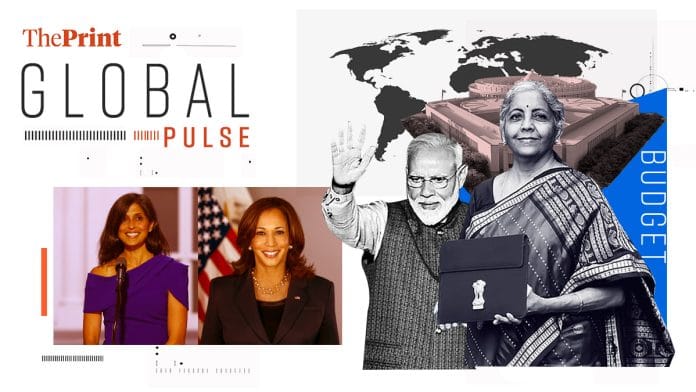New Delhi: Prime Minister Narendra Modi, whose return “big businesses” have welcomed, “faces an early test to his third term in office” as his government prepares the Union Budget while balancing the demands of coalition partners, reports the Financial Times.
The report — ‘India’s Narendra Modi faces budget demands from kingmaker allies’ — adds that investors will be watching the budget for “an early indication” of whether the government can continue business-friendly reforms and fiscal consolidation amid the demands of billions of dollars by Telugu Desam Party and the Janata Dal (United) for Andhra Pradesh and Bihar, respectively.
Correspondents Benjamin Parkin, Jyotsna Singh, and Chris Kay note that the new budget will follow a record Rs 2.1tn ($25bn) transfer from the Reserve Bank of India this year, which may help the government maintain or even lower the fiscal deficit, even if spending in coalition states increases.
However, with India facing historic levels of unemployment and inequality, “Modi may have limited time to show results” before the state elections in Maharashtra and Haryana, where his Bharatiya Janata Party (BJP) faces a “resurgent Opposition”, the report adds.
The Indian-American community in the US “has emerged as a political powerhouse over the past decade”, The New York Times reports, pointing out the possibility of Usha Vance, the spouse of Republican vice-presidential candidate J.D. Vance, becoming the second lady.
The report — ‘Indian Americans become a political force, just as Usha Vance’s profile rises‘ — also names 2024 presidential candidates Nikki Haley and Vivek Ramaswamy and Vice President Kamala Harris to illustrate its point. “There are now five Indian American members of Congress and nearly 40 Indian Americans in state legislatures — the highest number of any Asian origin group in the country,” correspondents Amy Qin and Jonathan Wolfe write.
The report highlights that Indian-Americans are “the wealthiest and most highly educated origin group on average” in the US and that they recently surpassed Chinese Americans to become the largest Asian group. While first-generation immigrants have mostly been Democrats since they see the party as more tolerant and supportive of safety-net policies, the Democrats, of late, have lost some support in the community, with some Republican leaders now seeing a chance to make inroads.
A Bloomberg report says that urban Indians have a high predisposition to diabetes and other metabolic diseases — partly due to their diet — but food regulators seem determined to make the problem worse.
In the report — ‘India needs to face up to its junk food crisis‘, columnist Mihir Sharma writes that the change in diet from fresh to packaged food often gets the blame, but deep-fried street food may not be a better alternative, considering packaged food at least comes with some regulations. However, Indians can not trust packaged food due to inadequate regulations and hard-to-understand nutritional information on labels. Meanwhile, the offerings on the street taste better.
“Indians need simple, easy-to-understand, and prominent warning labels so that their better natures are given a chance to overtake their impulses,” Sharma suggests, giving the example of the Sri Lankan “traffic light” system for soda bottles, which are colour-coded depending on their safety levels.
Modi snubbed the Shanghai Cooperation Organization (SCO) summit in July, “suggesting that not all is smooth sailing between India and its traditional adversaries, China and Pakistan,” says a report in The Diplomat — ‘What is the SCO doing wrong? Lessons from ASEAN and SAARC’.
The report highlights India’s central position in South Asia, and Russia’s and China’s peripheral but influential roles in Central Asia, allowing these countries to exert control in the respective regions. But, the SCO still has not managed to institutionalise cooperation in key areas such as development, energy and free trade, says the report, blaming this on ideological differences, competition, and historic animosities taking precedence over the vision of creating a non-Western, multi-polar world order. The report credits the ASEAN countries for keeping the flow of goods and people moving more successfully.
Biden bows out, Bangladesh court scraps most job quotas
US President Joe Biden announced he will be stepping down from the presidential race in the interest of his party and endorsed Kamala Harris as his successor. To know more, follow CNN’s live coverage.
After weeks of demonstrations and nearly a week of violence sparked by controversial job quotas in Bangladesh, the country’s top court has scaled back on reservations. To know more, read Al Jazeera’s report.
(Edited by Madhurita Goswami)
Also read: ‘Epic bust-up’ between India & China may be ending & young Indians gambling on stocks — global media






